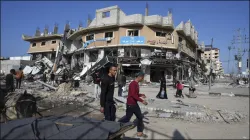Qatar and France broker deal for delivery of urgent medical aid to hostages, civilians in Gaza
The medical aid would be flown to Egypt and delivered to Gaza through the Ragah border crossing, according to the office of Israeli PM Benjamin Netanyahu. France said the negotiations were ongoing for several weeks and the medical packages were to be delivered to 45 hostages.

Qatar and France have brokered a deal with Israel and Palestine-based militant group Hamas to deliver urgent medicines to Israeli hostages held in Gaza in return for humanitarian assistance for the most vulnerable civilians in the besieged Palestinian enclave. The two countries said the aid would leave from Qatar on Wednesday and will be taken through the Rafah border crossing.
Qatari foreign ministry spokesperson Majed al-Ansari said the deal would mean "medicine along with other humanitarian aid is to be delivered to civilians in the Gaza Strip, in the most affected and vulnerable areas, in exchange for delivering medication needed for Israeli captives in Gaza". He did not detail the amount or specific contents of the aid to be given.
Israeli Prime Minister Benjamin Netanyahu's office on Tuesday confirmed that two Qatari Air Force planes are expected to fly to Egypt with medicines that have been purchased in France as per the list complied in Israel. The medicines will be transferred by Qatari representatives to their final destination in the Gaza Strip.
Philippe Lalliot, head of France's foreign ministry crisis centre responsible for aid efforts, earlier said negotiations had been going on for weeks and the initial idea had come from the families of some of the Israeli hostages. Specific medical packages for several months, which were put together in France, would be delivered to each of the 45 hostages. The International Committee of the Red Cross will coordinate on the ground.
There are three French nationals still being held in Gaza, but none of them are in need of urgent medication, said Lalliot. Israel says 132 hostages in Gaza and that 25 have died in captivity, following the release of over 100 captives during a week-long truce in late November. Hamas has said it will not release any captives until Israel ends the war.
What is happening in Gaza now?
The humanitarian catastrophe in Gaza continues to intensify with 85 per cent of the territory’s 2.3 million population displaced and UN agencies warning of mass starvation and disease. The conflict threatens to widen after the US and Israel traded strikes with Iranian-backed groups across the region.
In Gaza, the Israeli military said its forces located some 100 rocket installations and 60 ready-to-use rockets in the area of Beit Lahiya, a town on the territory’s northern edge. Israeli forces killed dozens of militants during the operation, the military said.
Residents reached by phone on Tuesday described the heaviest fighting in weeks in Gaza City. The military said at least 25 rockets were fired into Israel on Tuesday, damaging a store in one of the strongest bombardments in more than a week. Gaza’s Health Ministry said Tuesday that the bodies of 158 people killed in Israeli strikes have been brought to hospitals in the past 24 hours, bringing the war’s overall death toll to 24,285.
UN Secretary-General Antonio Guterres said UN agencies and their partners “cannot effectively deliver humanitarian aid while Gaza is under such heavy, widespread and unrelenting bombardment.” At least 152 UN staffers have been killed in Gaza since the start of the war.
War threatens to expand
The war has threatened to ignite other fronts in the Middle East, particularly with the involvement of Iran from Lebanon, Iraq and Syria. Iran launched missiles targeting what it called Israeli "spy headquarters" at a Kurdish semiautonomous region in Iraq, killing several civilians. Iraq and the US condemned the strikes, and Baghdad recalled its ambassador to Iran in protest.
Iranian-backed groups in Iraq and Syria have carried out dozens of attacks on bases housing US forces, and an American airstrike in Baghdad killed an Iranian-backed militia leader earlier this month. Elsewhere, Iranian-backed Houthi rebels in Yemen have resumed their attacks on container ships in the Red Sea following a wave of US-led strikes last week. The US military carried out another strike on Tuesday.
Israel and Lebanon’s Hezbollah militant group have exchanged fire along the border nearly every day since the war in Gaza began. The strikes and counterstrikes have grown more severe since an Israeli strike killed Hamas’ deputy political leader in Beirut this month, raising fears of a repeat of the 2006 war between the two countries.
(with inputs from agencies)
ALSO READ | Hamas releases video purportedly showing dead bodies of Israeli hostages as war crosses 100-day mark